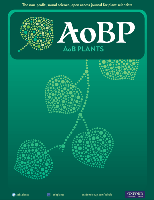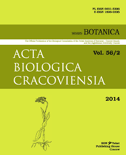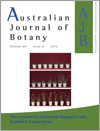
Egyptian Journal of Botany
Scope & Guideline
Cultivating innovation in plant sciences.
Introduction
Aims and Scopes
- Plant Biotechnology and Molecular Biology:
Research focusing on plant genetic engineering, molecular characterization, and the development of transgenic plants to enhance resistance to diseases and environmental stresses. - Ethnobotany and Medicinal Plants:
Investigations into the traditional uses of plants, their pharmacological properties, and the conservation of medicinal flora, highlighting the cultural significance and potential therapeutic applications. - Environmental Botany and Ecology:
Studies that assess the impact of environmental factors on plant growth, biodiversity, and ecosystem health, including the effects of pollutants and climate change. - Plant Physiology and Biochemistry:
Research exploring the physiological responses of plants to various abiotic stresses, including drought, salinity, and temperature, and their biochemical pathways. - Sustainable Agriculture and Crop Improvement:
Innovative approaches to improving crop yield and quality through sustainable practices, including the use of biofertilizers, biopesticides, and advanced cultivation techniques. - Phytoremediation and Soil Health:
Studies focusing on the use of plants for environmental rehabilitation, particularly in the remediation of contaminated soils and water. - Fungal and Microbial Interactions with Plants:
Research on the role of fungi and microbes in plant health, including their use in biocontrol and enhancement of plant growth.
Trending and Emerging
- Nanotechnology in Plant Science:
An increasing number of studies are exploring the application of nanotechnology in agriculture, including the use of nanoparticles for enhancing plant growth, disease resistance, and bioremediation. - Climate Change and Plant Responses:
Research focusing on the effects of climate change on plant physiology and ecology is gaining momentum, emphasizing the need to understand and mitigate the impact of global warming on plant species. - Biological Control and Sustainable Practices:
There is a notable trend towards the use of biological control agents and sustainable agricultural practices to manage pests and diseases, reflecting a shift away from chemical methods. - Phytochemicals and Their Health Benefits:
Studies investigating the bioactive compounds in plants and their potential health benefits are increasingly prevalent, aligning with growing interest in natural remedies and functional foods. - Restoration Ecology and Conservation:
Emerging research themes focus on ecological restoration and conservation strategies for endangered plant species and habitats, addressing biodiversity loss and ecosystem degradation.
Declining or Waning
- Traditional Taxonomy and Plant Systematics:
There appears to be a waning focus on classical plant taxonomy and systematic studies, potentially due to the increasing reliance on molecular techniques for species identification and phylogenetic studies. - Conventional Breeding Techniques:
Research centered on traditional breeding methods is becoming less prominent as biotechnological advancements and molecular approaches gain more traction in crop improvement. - Agronomy of Non-Economic Plants:
Studies related to the agronomy of lesser-known or non-economic plants are decreasing, possibly overshadowed by research focused on commercially important species. - Plant Pathology Focused on Non-Pathogenic Species:
Research centered on the pathology of non-pathogenic species is declining, as the journal trends towards addressing more impactful plant diseases and pests that threaten agricultural productivity.
Similar Journals

BOTANICAL REVIEW
Shaping the future of plant research through rigorous scholarship.BOTANICAL REVIEW is a highly esteemed journal published by SPRINGER, renowned for its commitment to advancing the fields of Ecology, Evolution, Behavior and Systematics and Plant Science. Established in 1935, this journal has become a cornerstone for researchers and professionals, reflecting over eight decades of rigorous scholarship. With an impressive impact factor and ranking within the top quartile for both its fields—Q1 in Ecology, Evolution, Behavior and Systematics and Plant Science—BOTANICAL REVIEW remains a key platform for disseminating critical findings and fostering scientific dialogue. Although it is not an open-access journal, its accessibility through institutional subscriptions enhances its reach among the academic community. The journal not only emphasizes the ecological aspects of plant life but also integrates evolutionary context to inform current practices and theories in botany. With a dedication to exploring the complex interactions within botanical sciences, BOTANICAL REVIEW continues to shape the future of plant research.

Plant Science Today
Innovating today for a greener future in plant sciences.Plant Science Today is a prominent journal dedicated to advancing the field of plant sciences through innovative research and comprehensive reviews. Published by HORIZON E-PUBLISHING GROUP in India, this open-access journal has been actively disseminating knowledge since its inception in 2018, with a convergence period extending to 2024. With an ISSN of 2348-1900 and a growing reputation, it is categorized in various quartiles for 2023, notably achieving Q3 in Biochemistry, Genetics and Molecular Biology (miscellaneous), while it holds Q4 rankings in critical fields including Ecology and Plant Science. As a valuable resource for students, researchers, and professionals, Plant Science Today aims to inspire discussion and innovation in the realm of ecological and plant science disciplines, where it currently ranks within the lower percentiles in prominent categories such as Environmental Science and Agricultural and Biological Sciences. The journal serves as a crucial platform for the exploration of experimental and theoretical advances, fostering a community eager to explore plant biology's complexities.

Chemical and Biological Technologies in Agriculture
Exploring Synergies Between Chemistry, Biology, and AgricultureChemical and Biological Technologies in Agriculture is a premier open-access journal published by SPRINGER, dedicated to advancing research in the fields of agronomy, crop science, biochemistry, biotechnology, and food science. Established in 2014, this journal has quickly gained recognition, boasting impressive rankings with Q1 status in Agronomy, Crop Science, Biotechnology, and Food Science categories as of 2023, underscoring its significance in fueling innovations in agricultural technology. With an E-ISSN of 2196-5641, it provides a platform for researchers and practitioners to disseminate impactful findings and methodologies that address key challenges in sustainable agricultural practices. By facilitating open access to contemporary research, the journal aims to foster collaboration and knowledge exchange among multidisciplinary stakeholders in the agricultural sector. With a commitment to excellence reflected in its Scopus rankings, notably #57 in Agronomy and Crop Science, it serves as an invaluable resource for professionals, researchers, and students striving for breakthroughs in chemical and biological technologies. The journal remains at the forefront of addressing global food security and environmental sustainability through rigorous scientific inquiry.

AoB Plants
Connecting researchers to cultivate knowledge.AoB Plants is a distinguished open-access journal published by Oxford University Press, dedicated to advancing the field of plant science. Since its inception in 2009, this journal has played a pivotal role in disseminating high-quality research that encompasses a wide range of topics including plant biology, ecology, and biotechnology. With an impressive impact factor and a ranking in the Q1 quartile for Plant Science, AoB Plants is recognized for its innovative contributions and scholarly rigor, ranking #129 out of 516 in the Scopus Agricultural and Biological Sciences category, placing it in the 75th percentile among its peers. By promoting open-access availability of research findings, the journal empowers researchers and practitioners alike, facilitating greater collaboration and knowledge sharing in the global scientific community. Situated in the heart of the United Kingdom, AoB Plants continues its commitment to providing a platform for pioneering research and developments in plant science, thus fostering a deeper understanding of the crucial roles that plants play in our ecosystems and economies.

ACTA BIOLOGICA CRACOVIENSIA SERIES BOTANICA
Exploring biodiversity and conservation in every issue.ACTA BIOLOGICA CRACOVIENSIA SERIES BOTANICA is a distinguished journal published by the Polska Akademia Nauk (Polish Academy of Sciences), with its roots tracing back to 1996. As a pivotal publication in the field of Plant Science, it serves to disseminate high-quality research and findings, contributing to the ongoing development and understanding of biodiversity, plant ecology, and conservation. The journal is indexed under Scopus, ranked #203 out of 516 in its category, placing it in the 60th percentile and firmly within Q3 quartile for Plant Science in 2023. Researchers, professionals, and students will find invaluable content within its pages, enhancing their knowledge and supporting academic exploration. Although it currently does not offer open access options, the journal remains a crucial resource for those engaged in botanical sciences, with a commitment to advancing scholarship in Poland and beyond.

AUSTRALIAN JOURNAL OF BOTANY
Unveiling ecological interactions through rigorous research.The Australian Journal of Botany is a prestigious peer-reviewed journal published by CSIRO PUBLISHING, dedicated to advancing the field of plant sciences and ecology. Established in 1953, this journal provides a critical platform for researchers to share original research findings, reviews, and perspectives in subjects ranging from plant biology to ecological interactions, with a focus on Australian flora and its conservation. With an impressive impact factor and categorized in the Q3 quartile in both Ecology, Evolution, Behavior and Systematics and Plant Science, the journal ranks competitively within its fields, allowing authors to reach a diverse audience of professionals, students, and fellow researchers. The journal is accessible in print and electronically through its ISSN: 0067-1924 and E-ISSN: 1444-9862, providing wider access to vital research outcomes that influence environmental policies and natural resource management. As it aspires towards innovation and excellence, the Australian Journal of Botany remains an essential resource for those passionate about the richness of plant biodiversity and ecological understanding.

BANGLADESH JOURNAL OF BOTANY
Advancing Botanical Knowledge in BangladeshBANGLADESH JOURNAL OF BOTANY is a prominent publication in the field of plant sciences, dedicated to advancing research and knowledge within the botanical community. Published by the BANGLADESH BOTANICAL SOC, this journal serves as a vital platform for researchers and scholars seeking to disseminate their findings related to plant biology, ecology, and conservation practices, particularly within the unique context of Bangladesh's diverse flora. With an ISSN of 0253-5416 and an E-ISSN of 2079-9926, the journal encompasses a wide scope of topics, reflecting interdisciplinary approaches in botanical research. Since its inception, with convergence periods from 1996 to 2001 and from 2003 to 2024, it has garnered recognition, positioned in the Q4 category in the Plant Science field with a ranking of #459/516 in Scopus, indicating its contribution to the field despite its developing impact. Operating within Bangladesh, at the UNIV DACCA DEPT BOTANY, the journal provides a crucial insight into the ecological and agricultural implications of plant studies in the region, catering to the needs of academics, professionals, and students eager to engage with contemporary botanical research.

TURKISH JOURNAL OF BOTANY
Advancing plant science through rigorous research.Welcome to the TURKISH JOURNAL OF BOTANY, a prestigious publication dedicated to advancing the field of plant science. Established in 1990 and published by the Tubitak Scientific & Technological Research Council Turkey, this journal serves as a vital platform for researchers, professionals, and students to disseminate their findings and insights on various botanical topics. With an impressive H-index that underscores its academic influence and recognition in the field, the journal is positioned in the Q2 quartile of plant science according to the latest category rankings. The ISSN of the journal is 1300-008X and the E-ISSN is 1303-6106, ensuring broad accessibility in both print and digital formats. As of 2023, it ranks #213 out of 516 in Scopus for Agricultural and Biological Sciences, placing it in the 58th percentile, which highlights its competitive standing among botanical journals. Researchers are encouraged to engage with its open-access options where available, fostering a collaborative and accessible research environment. With its commitment to quality and scientific rigor, the Turkish Journal of Botany remains an essential resource for anyone engaged in the exploration of plant sciences.

Plants-Basel
Connecting researchers to the world of plant science.Plants-Basel is a distinguished open access journal published by MDPI since 2012, offering a comprehensive platform for researchers and professionals in the field of ecology, plant science, and evolutionary biology. Based in Switzerland, this journal has established itself as a leader in disseminating high-quality research, evident through its impressive rankings in multiple categories, including Q1 in Ecology and Plant Science for 2023. With a substantial impact factor and a dedicated focus on advancing our understanding of plant interactions, ecosystems, and sustainable practices, Plants-Basel is vital for scholars seeking to contribute to these critical fields. The journal's commitment to open access enhances visibility and accessibility, facilitating the widespread sharing of knowledge essential for addressing contemporary ecological challenges.

Bioagro
Exploring innovative research for a greener future.Bioagro is an esteemed academic journal dedicated to advancing research in the field of Agricultural and Biological Sciences. Published by the University Centroccidental Lisandro Alvarado in Venezuela, this journal has made significant strides since its inception in 2008, with a focus on delivering high-quality research publications that address contemporary challenges in agriculture and biology. Recognized for its contributions, it holds a Q3 ranking in the Agricultural and Biological Sciences (miscellaneous) category as of 2023, and it ranks #125 out of 221 in its field, placing it in the 43rd percentile. Although it operates on an Open Access model, Bioagro strives to provide broad access to innovative research, thereby fostering collaboration and knowledge dissemination among researchers, professionals, and students. With a commitment to include a wide range of topics, the journal aims to be a pivotal platform for exploration and dialogue in agricultural sciences, ensuring that key findings reach both scientific and practitioner audiences. Located in Barquisimeto-Cabudare, Lara, Venezuela, Bioagro invites submissions that contribute to the global discourse on sustainable practices and innovations in agriculture.